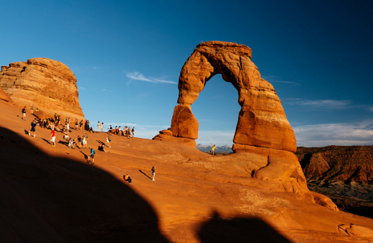Picture this: an oil pump right outside the entrance of Arches National Park with a gas flare burning nearby. Though this would never actually occur, due to the tourist industry and land use regulations such as the Moab Master Learning Plan (MLP), I want to ask the question: Should it happen? What would change about the way we see land use if oil pumps were in sight instead of in remote areas rarely seen by any visitors?
The MLP is a plan created by the Bureau of Land Management (BLM) that will essentially set guidelines on how to manage over 750,000 acres of public land around Moab as well as Arches and Canyonlands National Parks. The plan seems like a win for the environment because it will impose stricter regulations on any oil, gas and potash development and keep that development out of sight from tourist areas. If it passes next week, many will celebrate the compromises of environmental groups and extraction industries. But when it comes to the world we live in, is compromise something we should be striving for?
The late Martin Litton, a famous Grand Canyon river guide, once said that “to compromise is to lose.” When we compromise on something as critical as the environment, we lose a lot more than we bargain for. As seen time and time again, pollution can’t be contained. Even the “safest” forms of resource extraction often experience mishaps, which then result in poisoned watersheds, wildlife fatalities, negative impacts on human health and even human fatalities.
When speaking to a friend recently about how the Moab MLP would keep development out of sight, he said he’d prefer development to occur right at the entrances of National Parks, so everyone would see it. His argument was that things wouldn’t change until we become aware of what’s happening. When it comes to environmental degradation, the common theme seems to be “out of sight, out of mind.”
Fittingly, this is the case with climate change. Similar to a child putting their hands over their eyes and saying, “if I can’t see you, you can’t see me,” just because we can’t immediately see climate change in our daily lives doesn’t mean it’s not happening. Already, millions of people around the world are suffering and dying because of climate change in the forms of extreme weather patterns as well as heightened cases of diseases like malaria. If we could just connect the dots to see that removing fossil fuels from the ground in places like Utah can lead to things like thousands of Syrian refugees dying (the Syrian war is, in part, a result of a massive drought that occurred in 2006), I think we would look at our land use decisions differently.
If I could, I would urge everyone on this planet to send in comments to the Utah BLM office concerning the Moab MLP. In the 21st Century, nothing is truly local anymore. Decisions made in Utah have far-reaching repercussions elsewhere. People being evacuated from the islands of Papua New Guinea due to sea level rise will not likely be commenting on the Moab MLP, though their voices should be heard in the debate. It is then our responsibility, as global citizens, to make our voices heard in these matters. Especially for the millennial generation, the time to talk about these issues we’re inheriting is now. Public comment period for the Moab MLP ends Nov. 23. Send in your comments by email to [email protected].
Ayja Bounous
U Graduate Student
Envionmental Humanities


